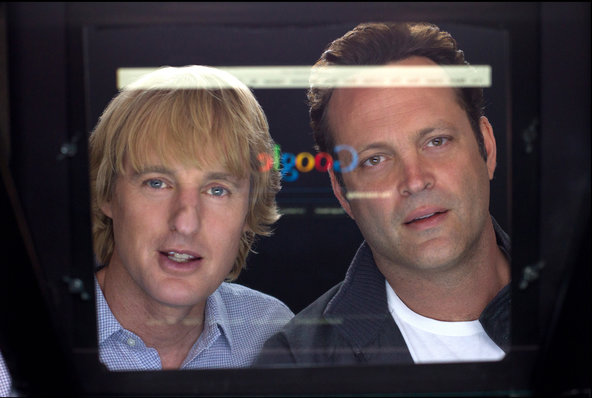 Phil Bray/20th Century Fox “The Internship” depicts Google as some dreamy foreign land.
Phil Bray/20th Century Fox “The Internship” depicts Google as some dreamy foreign land.
Coming soon to a theater near you: an advertisement for Google, in the form of a feature film.
“The Internship” is a comedy starring Vince Vaughn and Owen Wilson as two washed-up, laid-off salesmen who get internships at Google. They have no tech experience and, past 40, are ancient by Silicon Valley standards.
The movie is funny in parts, predictable in others, but underlying it all is an extended product placement for all things Google.
“Imagine the greatest amusement park you’ve ever been to as a kid,” Mr. Wilson’s character says upon arriving on Google’s campus. “Now imagine nothing like it and a million times better. That’s where we are.”
Shawn Levy, the film’s director, said at the San Francisco premiere that the movie was irreverent and that he was not trying to serve any agenda other than entertainment. “There was no way to do this movie well if the company wasn’t willing to have a sense of humor about themselves,” he said.
Still, there are lines that sound as if they were written by Google’s marketing department instead of by the screenwriters, Mr. Vaughn and Jared Stern.
Mr. Wilson’s love interest in the movie earnestly explains that she works such long hours because she believes that Google is making the world a better place. At one point, a character says, “You can actually have the same tabs open across all your devices” — which happens to be one of the features of the Chrome browser that Google is trying to promote.
And when a character asks for a definition of Googliness, a word that Google employees actually use to describe one another, someone replies, “The intangible stuff that made a search engine into an engine for doing good.”
Even if the marketing department did not write those lines, it did create the closing credits sequence, in which nearly every Google product makes an appearance, like Gmail, YouTube, Hangouts and Now to Drive. It was made by the Google Creative Lab, which also prepares Google’s ads.
And all the typical Google perks have cameos. Mr. Wilson’s love interest picks up her dry cleaning at the office and they flirt in nap pods. And when Mr. Vaughn’s character first orders coffee and discovers it’s free, he adds seven bagels to his order. There is even a chase scene on Google’s primary-color bikes.
Lorraine Twohill, Google’s vice president of global marketing, said at the premiere that Mr. Vaughn approached Google with the idea two years ago, and the company agreed. The marketing department worked with the film’s producers throughout the process and read the script. Mr. Levy said that Google did not have editorial control and that much of the final film was improvised by Mr. Vaughn and Mr. Wilson anyway.
Still, according to news reports, Google had some veto power: it jettisoned a scene in which one of its driverless cars crashed. (Instead, as the two stars stare at the empty driver’s seat, Mr. Wilson’s character says, “It’s scary because it’s new.”) Yet Google didn’t step in with other elements, like the Google employee who moonlights at a strip club.
Google clearly thinks the film can do wonders for recruiting. Last month, Larry Page, Google’s chief executive, said the company had participated because the movie made computer science cool and might encourage people to pursue it. Last week, Google drove employees and interns in buses to see the movie, drink at an open bar and see Mr. Vaughn, Mr. Wilson and Mr. Levy in person. (Ms. Twohill, though, was quick to tell the interns that the movie did not portray real life at Google.)
“The Internship” depicts Google as some dreamy foreign land. Mr. Levy said he shot the first part of the movie, before arriving at Google, without much color, to paint Google as the Emerald City.
Though only some scenes were shot on Google’s Silicon Valley campus, and the rest at Georgia Tech, many of the surprising details are realistic. Self-driving cars really do drive by, and Sergey Brin, one of Google’s co-founders, really does randomly show up riding an elliptical bike in workout clothes.
Other details, not so much. For instance, moviegoers may be disappointed to discover when they search for a 1-800 number that Google has no help line for questions about all its products.
Article source: http://bits.blogs.nytimes.com/2013/06/04/a-feature-film-starring-google/?partner=rss&emc=rss
